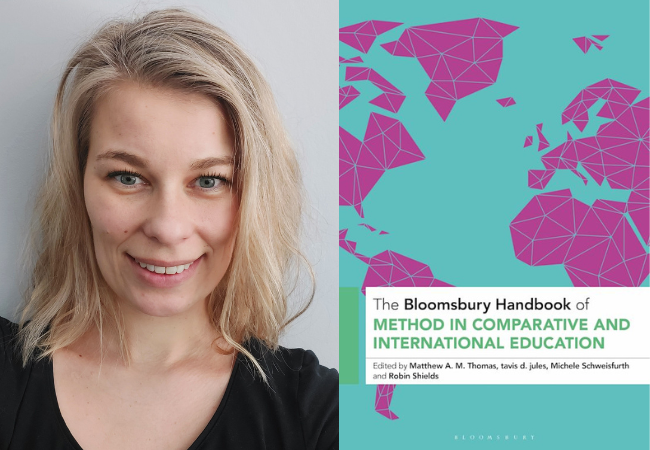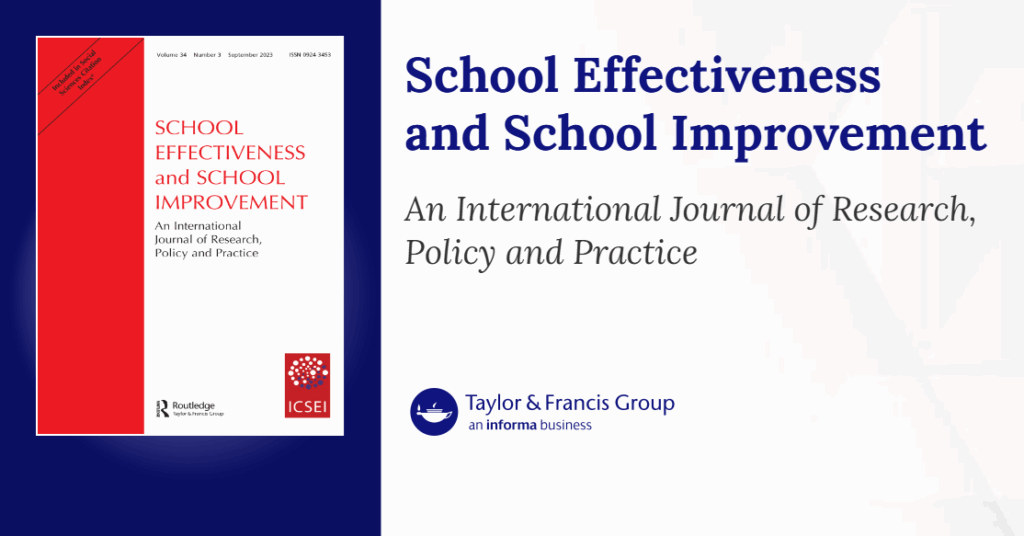
Yorkville University’s Dr. Jennifer Luoto has been making waves in international education research recently, contributing to a series of publications that explore how teaching quality is understood, observed, and measured.
A Senior Manager of Program Design at Yorkville, Luoto’s recent scholarship includes a contribution to The Bloomsbury Handbook of Method in Comparative and International Education.
For that text, she co-authored a chapter on observation methods alongside Dr. Diana Rodríguez-Gómez (University of Wisconsin-Madison) and Dr. Matthew A.M. Thomas (University of Glasgow) in which they explored how approaches ranging from structured observation to ethnography can provide rich insights into classroom dynamics.

Luoto also recently cowrote three of the six articles in a special issue of School Effectiveness and School Improvement: An International Journal of Research, Policy and Practice that provides an overview of six different frameworks. The frameworks included are based on the following categories: the purpose and theoretical grounding of the observation framework; the conceptualization of teaching quality; the specificity of focus; grain size; and empirical evidence and use. Luoto, who collaborated on the articles with her University of Oslo colleagues, also served as the co-editor of the issue.
– Breaking out of silos: using classroom videos for cross-disciplinary and cross-methodological examinations of teaching qualities, co-authored Dr. Armin Jentsch and Dr. Kirsti Klette
– Protocol for Language Arts Teaching Observation (PLATO) as a lens for assessing teaching quality, co-authored by Dr. Camilla G. Magnusson and Dr. Mark C. White
– Do observation tools matter? Unpacking shared and distinct patterns in teaching quality, co-authored by Dr. Armin Jentsch and Dr. Kirsti Klette
Luoto also cowrote the following piece in a different special edition of School Effectiveness and School Improvement:
– Context in research on teaching quality: bringing a complex idea into the spotlight, co-authored by Dr. Armin Jentsch (University of Oslo), Dr. Stefan D. Keller (Zurich University of Teacher Education) and Dr. Benjamin Fauth (Universität Tübingen)
Jeffrey Brewer, Director of Curriculum Design, said Luoto’s scholarly expertise informs her role here at Yorkville, ensuring that the latest insights in pedagogy and research directly shape the programs that support Yorkville students’ success.
“Jennifer’s scholarship reflects both her expertise and foresight, qualities that elevate our Curriculum Design team and advance Yorkville’s focus on designing programs that stand the test of time,” said Brewer.
Luoto recently sat down to reflect on her scholarship, the value of international collaboration, and how her research continues to inform her work in program design at Yorkville University. Here’s what she had to say:
What excites you most about the research directions you’ve been exploring in your recent publications?
I think it is very interesting and important to try and unpack complex concepts like teaching quality. Different methods and perspectives drive different conceptualizations and operationalizations, showing how a concept like teaching quality is shaped by so many different aspects, and I find it exciting to navigate this complexity. There are seldom easily generalized answers, as teaching and learning always occur in the context of a myriad of factors, including societal and cultural values.
Your work often involves collaboration with international scholars – what have you learned from these partnerships that informs your work at Yorkville?
Through my experiences working alongside international scholars, I have come to appreciate the value of attentive listening and the practice of asking critical questions. These collaborations have encouraged me to reconsider and challenge long-held assumptions, not only to reach common ground, but also to unlock new opportunities and perspectives.
This approach directly informs my leadership style in managing a team, fostering a culture of inquiry and openness. It also shapes my engagement with a diverse range of stakeholders at Yorkville University, especially when developing new programs across various fields. By grounding our work in thoughtful dialogue and a willingness to question established norms, we may enhance both our collaborative processes and the outcomes for our academic community.
Teaching quality is a complex concept – how do you see your research helping educators and institutions better understand and measure it?
Yes, it’s a complex concept. My research demonstrates this complexity and aims to help educators and institutions develop teaching strategies and measures of quality based on definitions of teaching quality that fit their objectives and values. In my team Program Design, we discuss what quality curriculum is and develop strategies for how to balance perspectives of faculty, students, and academic and institutional expectations.
In contributing to The Bloomsbury Handbook of Method in Comparative and International Education, you explored observation methods – how can these approaches strengthen program design here at Yorkville?
Within the context of Program Design, reviewing recorded meetings can help teams identify how specific discursive moves contribute to or hinder innovation and problem solving. By systematically analyzing these interactions, academic teams can refine their collaborative strategies and strengthen outcomes in program development.
In developing curriculum for new programs, observational approaches can also be integrated into student assessments. For instance, students might record their collaborative brainstorming sessions or presentations, then critically analyze the strengths and growth opportunities demonstrated in their collaboration, leadership skills, or the clarity and effectiveness of their content delivery. Although watching oneself perform may initially feel uncomfortable, this reflective practice provides unique insights into personal behavior patterns and cultivates self-awareness essential for continuous growth.
Looking ahead, how do you hope your scholarship will continue to influence both your field of study and the student experience at Yorkville?
It would be wonderful to conduct research within the realm of quality curriculum in higher education to strengthen the work undertaken by our Curriculum Design Team, as well as to contribute more broadly to the field. Utilizing both faculty and student perspectives regarding their experiences with the curriculum would be particularly valuable in shaping our understanding and approach.
Within the Program Design team, we continuously develop and refine new strategies for addressing challenges and seizing opportunities. This includes the integration of initiatives such as an AI assessment framework, Yorkville University’s Signature Learning Outcomes, and Universal Design for Learning (UDL) principles into our curriculum.
By conducting research on how these curriculum approaches impact student experiences, we can gain meaningful insight that will inform ongoing improvements. This process of reflection and analysis is essential to ensure that our curriculum remains responsive, effective, and aligned with the needs of both educators and learners.






